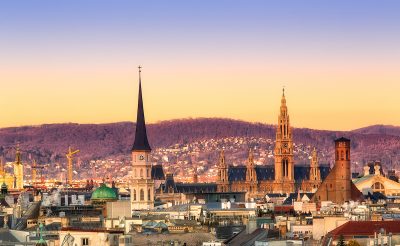City in focus: Vienna, Europe’s capital of the mind

For a century from the late 1700s, Vienna was the Silicon Valley of music composition, home to Mozart, Beethoven and many others. Then from the mid-1800s, it grew even more remarkable – a middling-sized European city from which poured forth a dazzling stream of new painting and film and architecture and writing, medical insight and discoveries in physics, the great minds from all these fields mingling and inspiring each other.
More than anything, Vienna for several decades led the world in thinking about thought itself, home to geniuses from Karl Popper to Sigmund Freud. Now Vienna wants to restore its status as a capital of the mind.
Europe’s liveability capital
Vienna boasts many of the classic attributes of lifestyle powerhouse cities. It’s safe, clean, politically stable, low density, and generally welcomes outsiders. It possesses fine schools, sumptuous restaurants and cafés, elegant nineteenth-century architecture, terrific inner-city transport, and Central Europe’s largest deciduous forest.
The UN Human Settlements Programme classified Vienna as being the most prosperous city in the world in 2012 and sixth in 2015. Those qualities have helped its battle with Vancouver, Melbourne and San Francisco for leadership in the global liveability rankings.
For nine consecutive years from 2009 to 2017, the HR consulting firm Mercer has ranked Vienna first for quality of living. The EIU 2016 Global Liveability Ranking put Vienna second, just behind Melbourne.
Innovation
Vienna ranked tenth out of 500 cities in innovation group 2thinknow’s 2016–17 Innovation Cities Index. In keeping with the city’s record as a medical pioneer, an innovation district for medical science and technology has been carved out in what is now the Neu Marx district.
Life sciences are a focus for a high proportion of Vienna’s private research facilities. Austrian financial institutions Raiffeisen Bank International, Erste Bank and Bank Austria play a key role in Central European credit. Vienna is also the world’s most popular conference city, with 120,000 people attending 186 international conferences in 2016.
The stain
Modern Vienna has been shaped by a dark history. Anti-Semitism rose in Vienna through the early years of the twentieth century, gradually pushing away Jewish talent – and the city did too little to push back. It scarcely resisted Hitler’s 1938 takeover of Austria, and the accelerating genocide of the next seven years destroyed a huge portion of the city’s intellectual brilliance.
The west’s bridge to the east
After World War II, historian Tony Judt has observed, the country was adjudged Hitler’s "first victim" and its pre-war enthusiasm for Nazism was conveniently forgotten. Vienna became the West’s gateway to Eastern Europe. Judt argues that Vienna "stood for ‘central Europe’: an imagined community of cosmopolitan civility that Europeans had somehow mislaid in the course of the century."
A city of headquarters
In the 90s, as the Soviet Union released its grip on Eastern Europe, Vienna once again became a vibrant European centre. Global firms began to choose it as their Eastern European base. Companies with European HQs here range from Taiwanese computer hardware company BenQ to German conglomerate Siemens.
The city hosts UN regional headquarters and global organisations including the International Atomic Energy Agency. The next challenge: to outcompete the other central European cities – Munich, Bratislava, Budapest, Prague – that are also attracting headquarters and facilities.
The road
The Austro-Hungarian emperor Franz Josef transformed Vienna in the late 1800s by
quite literally tearing down its old walls and replacing them with the Ringstrasse,
a grand road encircling the city on which magnificent new theatres, museums and other facilities were built. These include the Austrian Parliament, the Kunsthistorisches Museum and Vienna’s Votive Church.